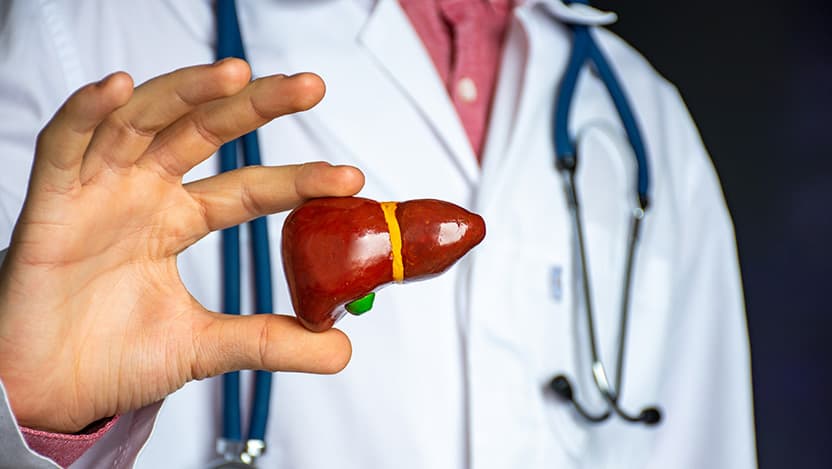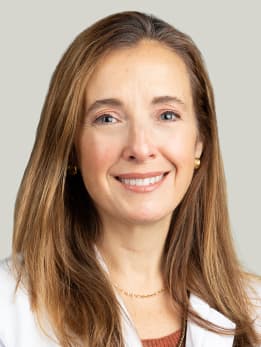The most common chronic liver condition: What is fatty liver disease and how is it treated?

Fatty liver disease (steatotic liver disease) is a liver condition where too much fat is stored in the liver cells. The condition can be caused by excessive drinking, but is becoming more common in patients who are overweight or obese. A more severe form called nonalcoholic steatohepatitis, or NASH, can cause inflammation, scarring and irreversible damage that may lead to cirrhosis and liver failure.
Fatty liver disease affects between 90 million to 100 million people in the United States, making it the nation’s most common chronic liver condition. Patients often suffer from other conditions as well, including heart disease, high blood pressure (hypertension), type 2 diabetes and other endocrine problems.
That's why the University of Chicago Medicine established a Steatotic Liver Disease Clinic. The clinic brings together specialists from several areas to orchestrate care for patients.
Request an appointment for fatty liver disease evaluation
What causes fatty liver disease (steatotic liver disease)?
It's no secret to anyone that we struggle with weight. The number of people who are overweight and have fat in their liver is now estimated to be between 90 million to 100 million. It's almost a third of the United States.
Most people don't develop liver-related complications like cirrhosis or liver cancerliver transplantation. And it's increasing rapidly.
It's a complex disease, and people who struggle with weight usually have different things going on. It's easy to focus on the liver, but they may also have type 2 diabetes, hypertension and lipid trouble.
What factors can lead to developing fatty liver disease?
There is one gene in particular, called PNPLA3, that is linked to increased risk for steatotic liver disease. People of different ethnic backgrounds have different frequencies of liver disease, and it's almost entirely based on the different frequency of this gene.
Diet is also very important. The Mediterranean diet, which emphasizes fruits and vegetables, whole grains, legumes, lean meat and healthy fats like olive oil, is very protective for this kind of liver disease. If you have a fast food diet with a lot of saturated fats, cholesterol and fructose, that's where you see severe, progressive forms of this illness.
What does the UChicago Medicine Steatotic Liver Disease Clinic offer patients?
Patients just have to make one call. On their first visit, they see three different specialists: an endocrinologist, a hepatologist (liver specialist) and a nutritionist. We have access to state-of-the-art imaging and non-invasive procedures with our Center for Endoscopic Research and Therapeutics (CERT) that are not available at many places in the country. We can arrange to have all these things taken care of in one visit, which might otherwise have taken three or four trips to the doctor. That’s a huge benefit for people who have travelled a long way or need to take time off work.
Our nutritionists will take a thorough history of eating habits, and even after the initial visit, they continue to follow up about diet. The nutritionists also provide a journal so patients can accurately describe what they're eating to help spot any more issues.
The best analogy is when you have fatty liver disease, it's a marker of a broader health concern that maybe you weren't aware of. What patients really need is an orchestra of caregivers, and this clinic will serve as the conductor for that orchestra. We'll bring together the right people to give them the care they need.
What are some innovative treatment options for fatty liver disease?
UChicago Medicine’s Steatotic Liver Disease Clinic provides many options to treatment, including endoscopic or nonsurgical approaches to weight loss. For patients who meet certain criteria, they have access to clinical studies for the most promising new therapies under development. There are many trials underway for fatty liver disease, and we try to pick the ones that are most likely to benefit our patients.
Who benefits the most from the clinic?
The most immediate benefit will be for someone who has had some progression of disease where we can reverse the course. Having said that, we want to see everyone who can benefit from what this clinic has to offer.
Our preference is not to wait for someone to have more advanced fatty liver disease, but to engage patients early so we can help them with education and diagnosis. We're also helping people with end-stage liver disease that may not be reversible. We have technologies to give them the best chance at reversing their illness, and we have a great liver transplant unit for patients whom reversal is not possible. Liver transplantation is, of course, our last resort.
What is the timeframe for fatty liver disease treatment?
Typically, it can take years, because it requires changes in lifestyle, diet, etc. But we've seen some exciting clinical trial data with an injectable treatment that takes the fat out of the liver in 16 weeks, inflammation is decreased, and scar tissue is decreased, too. These rapidly effective therapies are on the horizon, but they're still in the developmental phase. For now, I think of it like hypertension or heart disease, where once you demonstrate the ability to treat a disease, treatment may be for the long term. The potential for fatty liver disease to recur or progress is something we'll always have to be mindful of.
What's your goal for the Steatotic Liver Disease Clinic?
The goal for the UChicago Medicine Steatotic Liver Disease Clinic is clear: To be a national paradigm for managing the health crisis of fatty liver disease. The lifetime cost of healthcare for people with fatty liver disease is estimated to be about $950 billion, and that's a conservative estimate. It's a health crisis that's going to take prevention and, on occasion, intervention, but we're also looking for nutritional and lifestyle changes to engage in preventive health.
There may be a third of people in the country who have some form of this disease, but the great majority have never been treated. My goal is to come up with ways to identify people and make their treatment much more predictable and effective than it has been so far.
The great thing about UChicago Medicine is that we have all the important pieces. We have remarkable groups that often do their thing independently, but this clinic is an example of how we can bring them together. We have great access to imaging. We have the CERT program. We have a world-class endocrine team and outreach clinics in different parts of the community. This is an example how UChicago can bring together these resources to benefit patients.

Mary E. Rinella, MD
Dr. Rinella is an expert in fatty liver disease (steatotic liver disease). She provides comprehensive liver disease assessment and treatment, including nutritional intervention, the use of medications, endoscopy and clinical trials to deliver the most advanced treatment options.
See Dr. Rinella's physician bio